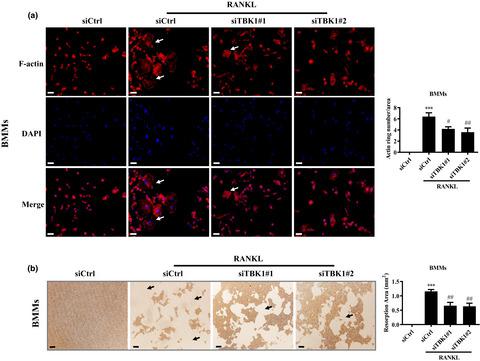当前位置:
X-MOL 学术
›
Immunol. Cell Biol.
›
论文详情
Our official English website, www.x-mol.net, welcomes your feedback! (Note: you will need to create a separate account there.)
TANK‐binding kinase 1 mediates osteoclast differentiation by regulating NF‐κB, MAPK and Akt signaling pathways
Immunology and Cell Biology ( IF 4 ) Pub Date : 2020-09-08 , DOI: 10.1111/imcb.12401 Shuai Lin 1 , Xiao-Li Zhao 1 , Zhen Wang 1
Immunology and Cell Biology ( IF 4 ) Pub Date : 2020-09-08 , DOI: 10.1111/imcb.12401 Shuai Lin 1 , Xiao-Li Zhao 1 , Zhen Wang 1
Affiliation

|
TANK‐binding kinase 1 (TBK1) belongs to the noncanonical IκB kinase (IKK) family. The ubiquitously expressed protein is well known to play a pivotal role in innate immune response and inflammation. Although excessive inflammatory activities have been shown to affect osteoclast (OC) differentiation and function, direct relevance of TBK1 in bone turnover is not known. In this work, we specifically altered the TBK1 protein level by knocking down or overexpressing it without affecting its homologous protein IKKε expression, and demonstrated the effect of TBK1 on OC differentiation in bone marrow macrophages (BMMs) and RAW264.7 cells upon induction by receptor activator of nuclear factor‐κB (NF‐κB) ligand (RANKL). TBK1 knockdown was found to markedly inhibit the OC differentiation and function, while TBK1 overexpression enhanced OC formation. Downregulation of TBK1 greatly suppressed RANKL‐induced gene expression of Mmp9, Atp6v0d2, Acp5, Ctsk andNfatc1 involved in the regulation of OC formation and function in both BMM and RAW264.7 cells. Mechanistic studies indicated that TBK1 affected the NF‐κB signaling pathway as well as mitogen‐activated protein kinases (MAPKs) and protein kinase B (Akt) activation during OC differentiation. Moreover, the protein level of TNF receptor‐associated factor 6 (TRAF6) was increased, and the interaction of TRAF6 with TBK1 was potentiated, by RANKL. Collectively, we provide direct evidence showing that TBK1 effectively mediates OC differentiation and function by regulating NF‐κB, MAPKs and Akt signals. A TBK1‐targeted therapeutic strategy may be useful for the treatment of bone‐related disorders.
中文翻译:

TANK结合激酶1通过调节NF-κB、MAPK和Akt信号通路介导破骨细胞分化
TANK 结合激酶 1 (TBK1) 属于非经典 IκB 激酶 (IKK) 家族。众所周知,普遍表达的蛋白质在先天免疫反应和炎症中起着关键作用。虽然过度的炎症活动已被证明会影响破骨细胞 (OC) 的分化和功能,但 TBK1 与骨转换的直接相关性尚不清楚。在这项工作中,我们通过在不影响其同源蛋白 IKKε 表达的情况下通过敲低或过表达 TBK1 来特异性地改变 TBK1 蛋白水平,并证明了 TBK1 对骨髓巨噬细胞 (BMM) 和 RAW264.7 细胞在受体诱导后的 OC 分化的影响核因子-κB (NF-κB) 配体激活剂 (RANKL)。发现 TBK1 敲低显着抑制 OC 分化和功能,而 TBK1 过表达增强了 OC 形成。Mmp9、Atp6v0d2、Acp5、Ctsk和Nfatc1参与了 BMM 和 RAW264.7 细胞中 OC 形成和功能的调节。机制研究表明,TBK1 在 OC 分化过程中影响 NF-κB 信号通路以及丝裂原活化蛋白激酶 (MAPK) 和蛋白激酶 B (Akt) 的激活。此外,通过 RANKL,TNF 受体相关因子 6(TRAF6)的蛋白质水平增加,TRAF6 与 TBK1 的相互作用得到加强。总的来说,我们提供了直接证据表明 TBK1 通过调节 NF-κB、MAPK 和 Akt 信号有效介导 OC 分化和功能。TBK1 靶向治疗策略可能有助于治疗骨相关疾病。
更新日期:2020-09-08
中文翻译:

TANK结合激酶1通过调节NF-κB、MAPK和Akt信号通路介导破骨细胞分化
TANK 结合激酶 1 (TBK1) 属于非经典 IκB 激酶 (IKK) 家族。众所周知,普遍表达的蛋白质在先天免疫反应和炎症中起着关键作用。虽然过度的炎症活动已被证明会影响破骨细胞 (OC) 的分化和功能,但 TBK1 与骨转换的直接相关性尚不清楚。在这项工作中,我们通过在不影响其同源蛋白 IKKε 表达的情况下通过敲低或过表达 TBK1 来特异性地改变 TBK1 蛋白水平,并证明了 TBK1 对骨髓巨噬细胞 (BMM) 和 RAW264.7 细胞在受体诱导后的 OC 分化的影响核因子-κB (NF-κB) 配体激活剂 (RANKL)。发现 TBK1 敲低显着抑制 OC 分化和功能,而 TBK1 过表达增强了 OC 形成。Mmp9、Atp6v0d2、Acp5、Ctsk和Nfatc1参与了 BMM 和 RAW264.7 细胞中 OC 形成和功能的调节。机制研究表明,TBK1 在 OC 分化过程中影响 NF-κB 信号通路以及丝裂原活化蛋白激酶 (MAPK) 和蛋白激酶 B (Akt) 的激活。此外,通过 RANKL,TNF 受体相关因子 6(TRAF6)的蛋白质水平增加,TRAF6 与 TBK1 的相互作用得到加强。总的来说,我们提供了直接证据表明 TBK1 通过调节 NF-κB、MAPK 和 Akt 信号有效介导 OC 分化和功能。TBK1 靶向治疗策略可能有助于治疗骨相关疾病。



























 京公网安备 11010802027423号
京公网安备 11010802027423号